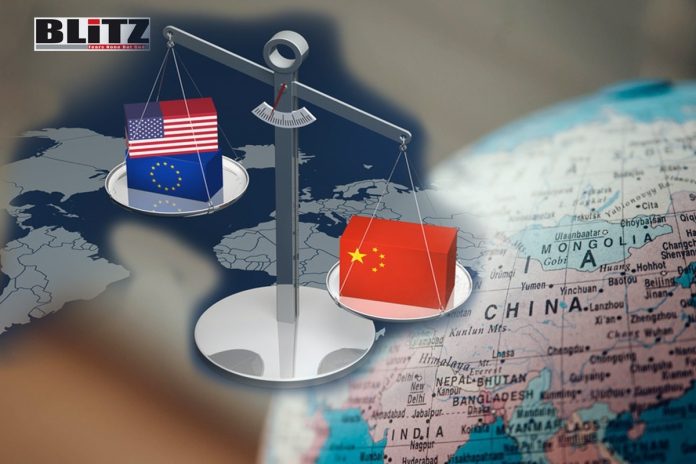In the complex web of global affairs, the equilibrium of power frequently pivots on the complexities of economic interdependency. Historically, lopsided relationships have empowered dominant nations to wield influence over their less reliant counterparts, leveraging economic dependencies as tools of control. Nevertheless, a transformative shift is underway, spearheaded notably by nations from the Global South, advocating for a more equitable distribution of economic connectivity. This heralds a departure from the era of hegemonic dominance towards a global order characterized by greater balance and inclusivity. Asymmetries are being challenged, and emerging economies are asserting themselves on the international stage, signaling a new chapter in the dynamics of global power relations.
Central to this evolution is the recognition that excessive dependence on any particular nation or region can be manipulated for geopolitical advantage. Across epochs, dominant forces like the United Kingdom and later the United States have consciously sought to uphold imbalanced interdependencies, hindering the proliferation of economic linkages among burgeoning centers of influence. Through the monopolization of pivotal industries, technological innovations, and financial infrastructures, these entities have cemented their supremacy in global affairs. However, the prevailing narrative is shifting as emerging powers assert themselves, challenging the status quo and advocating for a more diversified and equitable distribution of economic power. This marks a pivotal juncture wherein the dynamics of international relations are undergoing a profound recalibration towards a more balanced and inclusive global landscape.
However, echoing Friedrich List’s astute observation, enduring stability within the international economic framework demands a fairer allocation of interdependence among nations. This principle is exemplified in China’s ambitious Belt and Road Initiative (BRI), a modern reinterpretation of the historic Silk Road ethos, emphasizing collaborative partnerships and mutual prosperity over singular dominance. By implementing a range of transportation networks, financial instruments, and regional integration initiatives, the BRI embodies a vision of genuine multilateralism aimed at fostering economic progress for all involved countries. Unlike past hegemonic strategies, the BRI prioritizes inclusivity and shared benefits, acknowledging the interconnectedness of global economies and the necessity for collective advancement. In doing so, it offers a blueprint for a more balanced and sustainable approach to international economic relations, wherein mutual cooperation and mutual benefit serve as the foundation for a prosperous future.
At the core of China’s strategy lies the refusal to impose a hegemonic-centric development model on independent nations. The BRI, in contrast, advocates for cultural pluralism and honors each country’s sovereignty to chart its unique course toward prosperity. This stands in sharp contrast to the US-dominated approach, which frequently imposes its values and agenda disguised as universal standards. China’s stance underscores a commitment to fostering genuine partnerships based on mutual respect and cooperation, rather than coercion or unilateral imposition.
The decentralized structure of the Belt and Road Initiative (BRI) serves as a critical factor in fostering systemic incentives for conflict resolution. Through its emphasis on economic connectivity, the BRI has effectively facilitated ties between traditionally adversarial nations, exemplified by China’s efforts in fostering economic relations between Iran and Saudi Arabia. This approach highlights the potential of economic interdependence in mitigating geopolitical tensions and promoting cooperation. Moreover, within Central Asia, the alignment of interests between Russia and China within the Shanghai Cooperation Organization challenges Western expectations of rivalry, demonstrating a shared commitment to multipolarity and mutual benefit.
Moreover, the BRI’s inclusive approach has sparked analogous ventures globally, such as Russia’s Eurasian Economic Union and the International North-South Transportation Corridor connecting Russia, Iran, and India. These initiatives exemplify a shared ambition to broaden economic linkages and lessen reliance on singular entities, thereby enhancing the resilience of the global economy against potential vulnerabilities.
For nations of the Global South, this shift towards economic equality represents a unique opportunity to reclaim agency and forge their destinies towards prosperity. Platforms such as BRICS serve not only as a bulwark against external pressures but as forums for harmonizing economic interests and fostering shared growth. By uniting erstwhile adversaries like Saudi Arabia and Iran or Egypt and Ethiopia, BRICS exemplifies a spirit of cooperation that transcends geopolitical fault lines.
Amid Europe’s struggle with discordant conflicts, the Global South stands on the cusp of a transformative world order-one characterized by the rejection of economic coercion and the embrace of principles like mutual trust, mutual benefit, and equality, epitomized in the Shanghai Spirit. Through their advocacy for economic parity and promotion of inclusive development, Global South nations are not only reshaping the geopolitical terrain but also establishing the framework for a future marked by prosperity and harmony for all stakeholders involved.




